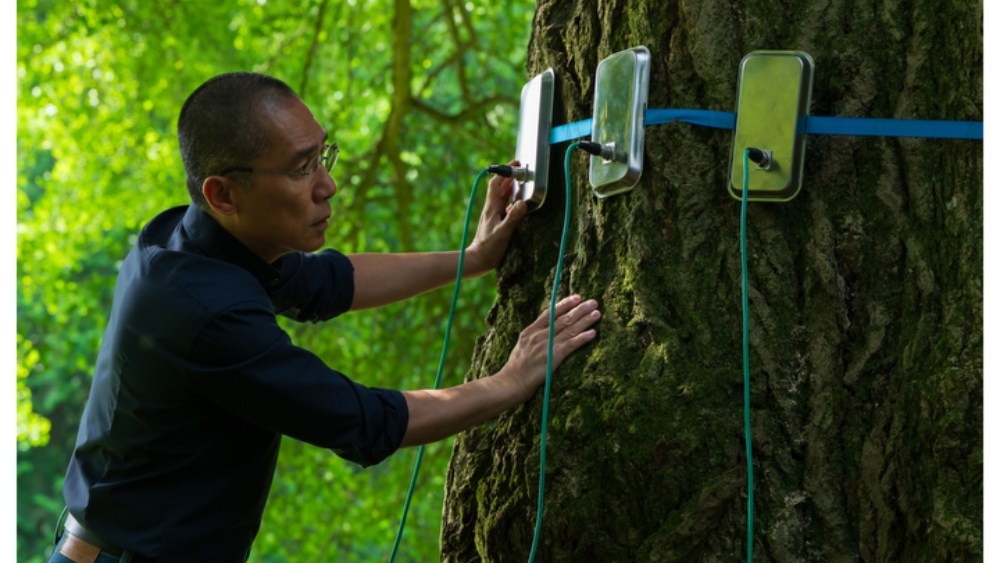In the Venice premiere “Silent Friend,” Hungarian director Ildikó Enyedi observes people trying to communicate with plants — in 1908, 1972 and 2020, respectively. Not for the first time, though. In her 1999 drama “Simon the Magician,” a plant served as a witness in a murder investigation.
“When I was a teenager in the 1970s, everything was about ‘flower power.’ There was a big wave of experimenting with plant communication, using sensors or interfaces to understand what’s happening between plants, how they perceive the world and communicate with each other. It died down after a while, but now I can see a revival,” she explains.
“It was a really beautiful and naive time,” says Enyedi, mentioning interrogation specialist Cleve Backster who attached a plant to a polygraph. Now, one of her characters ‘teaches’ potted geranium how to open a gate.
“This little experiment was based on something I read as a teenager. A scientist put sensors on his plant and realized it reacts each time he arrives home by car. He amplified little electric signals and it was able to open his garage,” she laughs.
“There is this strong wish to understand ‘the other’: a plant, an animal or another human being. It’s embedded in us. But light humor was really important to me. We can’t take ourselves so damn seriously.”
“Silent Friend” follows three different people at three different times at the same German university: the first female student there, a young man asked to take care of his crush’s plant and a neuroscientist from Hong Kong stuck there during the pandemic.
The latter, obsessed with a mysterious ginkgo tree in a botanical garden, is played by Tony Leung Chiu-wai, acting in his first European film.
“I had a very interesting conversation about it with Tony, because he was very interested in the philosophical undercurrents of the film. We shared books, TED Talks, and he told me that Eastern philosophy is all about oneness. There’s a natural curiosity of figuring out how to be a part of this world together and how to be apart,” says Enyedi, Oscar-nominated for “On Body and Soul.”
“It’s not just about repeating that we are ‘a part of nature,’ but about accepting our separation from it. There’s just a tiny slice of what we can perceive with our human senses. If we make peace with that, maybe we will start living our lives differently,” she observes.
“Silent Friend” could be seen as an ecological or even political statement and a call for respecting nature. But Enyedi resists such big words.
“Making a statement by NOT making a statement was very important to me. Many changes in our life could happen effortlessly if we just shifted our point of view a little,” she argues.
Sold by Films Boutique, it’s produced by Pandora Film, Inforg-M&M Film, Galatée Films and Rediance Films.
“If you ask for kindness in a militant way, it doesn’t work. But I’m always skeptical about only showing the dark side. It’s everywhere, that’s true, but it’s not the only truth. Every day, it shocks me how kindness appears in the most unexpected moments and most unexpected places.”
She had to figure out how to show plants while also suggesting their inner life.
“I was very adamant about it being quite simple. Again, taking into consideration our human limits, there are things we can only vaguely guess. It’s difficult to film a tree in a sensual, sensitive way. It doesn’t have a face. We spent a lot of time with my cinematographer Gergely Pálos, thinking about it.”
“This tree was in the middle of a town, which allowed us to embrace human perspective. But even in this man-controlled space there are complex beings who have a life, and who observe what we’re doing. And we’re totally unaware of it.”
For the 1908 episode, she came back to the work of German photographer Karl Blossfeldt, known for his black-and-white photographs of plants.
“They weren’t exotic: it was a cabbage, an onion, a little branch. But you could see the artist behind them, God or nature, in full bloom. You had a feeling you were on some unknown planet, looking at alien beings.”
She learned how to look at nature also during the pandemic, mirroring Leung’s character.
“I live in the middle of Budapest, on the fourth floor, and there is a giant cherry tree in front of my window. During lockdown, it was amazing to see it change and develop a very personal connection. Apichatpong Weerasethakul had the same experience, although he was luckier — he had the whole garden,” she smiles.
“In this kind of silence, we could finally notice we are not alone. Later, the film changed our entire crew. It forced them to pay attention and they were walking down a tree-lined street a bit differently.”
After the interview, Enyedi shares a poem by Sándor Weöres called “The Blurred Borders.”
“When you begin to deconstruct your own personality, you experience as the border between your soul and that of others gradually dissolves.
If you look into the eyes of your fellow human, you feel their emotions and realize: ‘This too, is me.’ If you pet a dog, you feel its world blending with yours: ‘This too, is me.’ If your touch lingers on a piece of furniture, you absorb its unstructured silence: ‘This too, is me.’
Your soul is not just your own, and the soul of all is your own. Everything is transparent, as if made of crystal. Suddenly, you become immeasurably abundant; your body and soul are refreshed, and work, rest, company and solitude fill you with equal joy.”
“He says it much better than me,” she writes.

